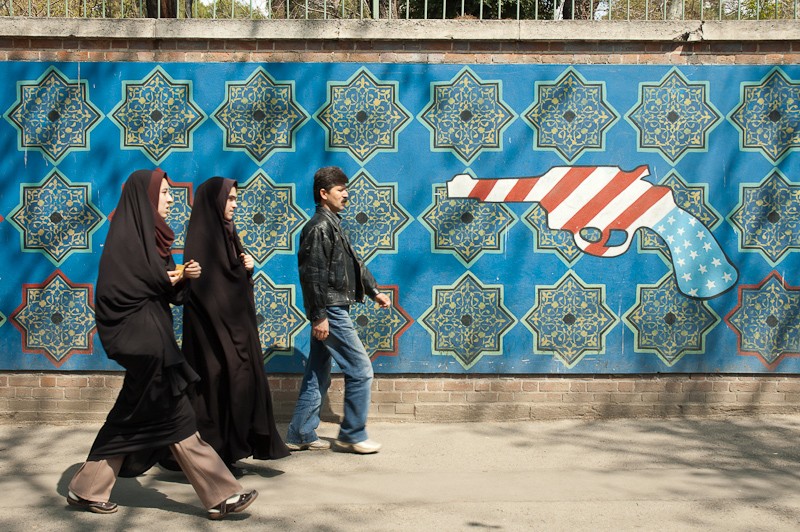Political judgment day in Iran is fast approaching, and word on the street is that the mud-slinging between sitting centrist President Hassan Rouhani and his hardline contender Ebrahim Raisi, the two front-runners of the presidential election today, has never been quite so grimy.
Three live televised presidential debates saw the six candidates (now four) come armed with blown-up screenshots, graphs and newspaper clippings. Debate raged over government spending on cabinet minister salaries and previously undisclosed purchases of large assets. Many of these documents were also circulated online. A copy of a letter by one of Rouhani’s first vice presidents, Es’haq Jahangiri, signing off on astronomical salaries, for example, received massive traction on social media.
Raisi, who is believed to have been quietly groomed as a successor to 77-year-old Ayatollah Ali Khamenei, has been at the forefront of claims of corruption and economic mismanagement against Rouhani. Some say it’s a plausible argument. “Rouhani based his entire first term on the Iran nuclear deal as a magic pill, which would solve all of the country’s economic problems,” says a Tehran-based journalist who declined to be named. “Not only has that not happened, some find themselves in a worse economic situation than before. The rich have gotten richer, proven by the influx of luxury items, while the poor have had to make do with stagnant salaries, if employed at all.
“Rouhani has tried to put the blame for this on the effects of the Ahmadinejad administration’s mismanagement,” he adds. “But after four years in power, no one is really buying that argument.”
It doesn’t help that many cabinet ministers around Rouhani have become rich as civil servants; the public perception is that they have amassed so much wealth, it prevents them from taking care of issues pertaining to government. “The fact that an unknown person like Mr. Raisi can mobilize relatively large numbers of people shows the seriousness of the economic situation that the country is facing,” notes Mohammad Marandi, a professor of English literature at the University of Tehran. “If he is elected, he’s going to have to change the way he conducts his presidency.”
The fierceness of the debate has alarmed some Iranians. “It worries me,” says Iranian-Canadian Farhad Souzanchi, who has been closely following the elections through YekRay (One Vote), an election-monitoring site he built. “It reminds me of the 2009 election when many journalists ended up in prison. Looking from the outside at the way the election is going — the atmosphere then was like this too … especially during the last day. There was a lot of passion — and each side viewed the other as a threat.”
The 2009 re-election of conservative President Mahmoud Ahmadinejad was marred by fraud and protests. Three leaders from the reformist Green Movement party have been under house arrest without charge since 2011.
There are also uncanny similarities between Raisi and Ahmadinejad. It’s telling that while Rouhani campaigns on a platform of freedom, security and progress, Raisi’s platform echoes the very issues that helped Ahmadinejad win his first presidency in 2005: fighting corruption, helping the poor and showing a stronger face to Western powers. His campaign team is also largely made up of former ministers who served under Ahmadinejad.

Outside the walls of the former U.S. Embassy in Tehran >Flickr/KamyarAdl
Perhaps more disconcerting, however, is the fact that Raisi’s political experience is tied to a time when he served as one of four judges who oversaw the execution of thousands of political prisoners in 1988.
Those executions are a deeply taboo subject in Iran – there is virtually no public discussion of it except on social media and in foreign news outlets. At a campaign rally last week though, Rouhani broke the ice through a thinly veiled reference to “those people who only have execution and imprisonment in their background.”
But he saved his harshest words for one of his final campaign rallies in the shrine city of Mashad on Wednesday. “This is a choice between war and peace,” he declared to thousands of supporters. “A mistake in who we elect as president will mean war.”
Whatever the outcome, one notion needs to be acknowledged in the Western narrative of Iranian politics: Amid all the mocking critiques over an electoral system that screens candidates, disqualifies leading reformists from running and often is deemed essentially futile because of a supreme leader who sits on top with the final say, a form of democracy and dissent does exist.
Iran’s presidents set the tone in shaping the country’s foreign and domestic policy for years to come. A cursory glance at Tehran’s starkly different leaders over the past 15 years – including a nuclear deal that no one thought would actually transpire – speaks to this better than anything else.
*Image: Hassan Rouhani, the president of Iran. >Flickr/United Nations Photo









